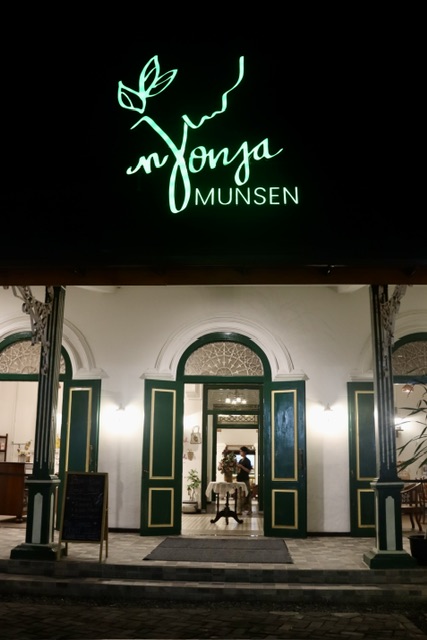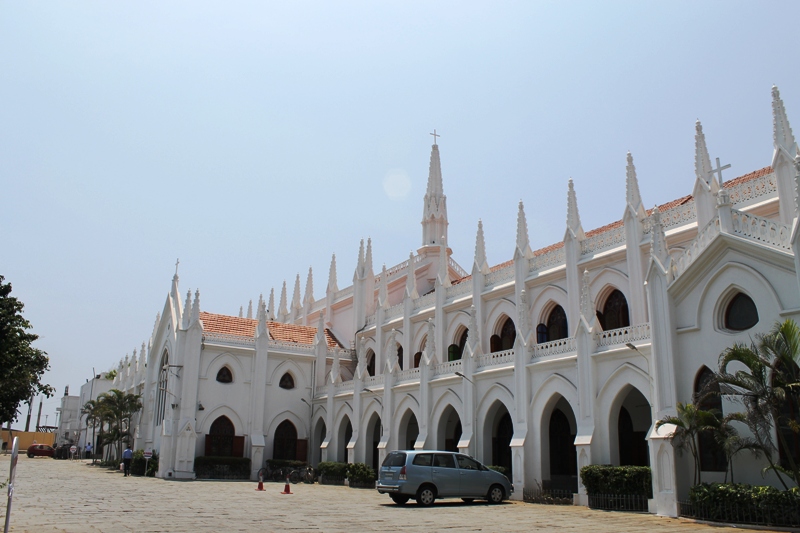I was truly surprised to find a restaurant that goes out of its way and does more to preserve the environment in Muntilan, a district in Magelang Regency, Central Java Province. My acquaintance, Bagus Priyana, a cultural activist in Magelang City, recommended Njonja Munsen Restaurant as one of the places I could visit in the “city” that spans 28.6 square kilometers.
The main road in Muntilan is never quiet because it serves as a route for vehicles traveling between Yogyakarta and Semarang, the capital of Central Java Province. However, when you enter the inner streets, the small-town atmosphere becomes apparent. It’s no wonder that when I visited Njonja Munsen Restaurant for dinner after it had been raining all day, the surroundings felt like it was already late at night, even though the clock only showed eight o’clock.
The name Munsen is derived from the name of a business area Muntilan Trade Center which in Indonesian is abbreviated MunSeN. The area used to have many colonial buildings. The building occupied by Njonja Munsen Restaurant is one of the remaining colonial buildings in that area.
Kolonial Tropical House
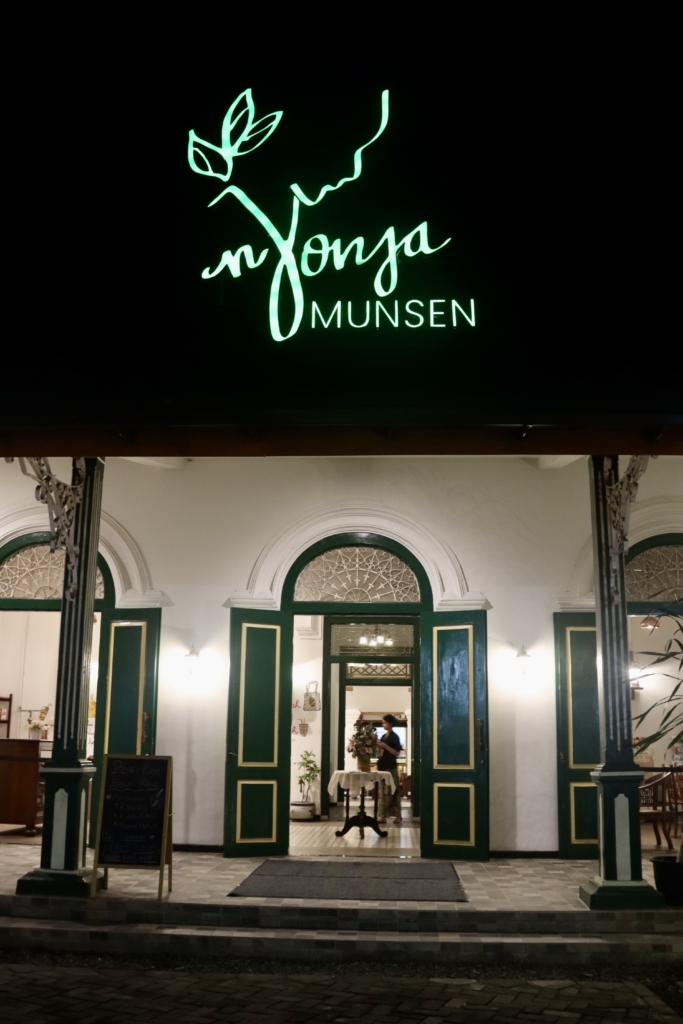
The motorcycle I was riding stopped right in front of a restaurant occupying a colonial-style house suited for tropical regions. I felt as if I was welcomed by two square wooden pillars standing upright on the front porch. Three wooden doors with horseshoe-shaped arches seemed to invite me inside. The doors, windows, pillars, and walls that were all painted in two dominant colors, dark green and ivory, gave a bright impression.

Stepping inside, I was immediately impressed by the writing ‘Towards a Zero Waste Home’ on the wall. It’s rare to find a restaurant with such a slogan. On the left side of the room, there is an open shelf containing various containers, ranging from glasses, water bottles, lunch boxes, to other neatly arranged storage containers. There is also a lower glass shelf for storing restaurant souvenirs. Meanwhile, on the right side of the room, there are tables and chairs provided for dining guests.
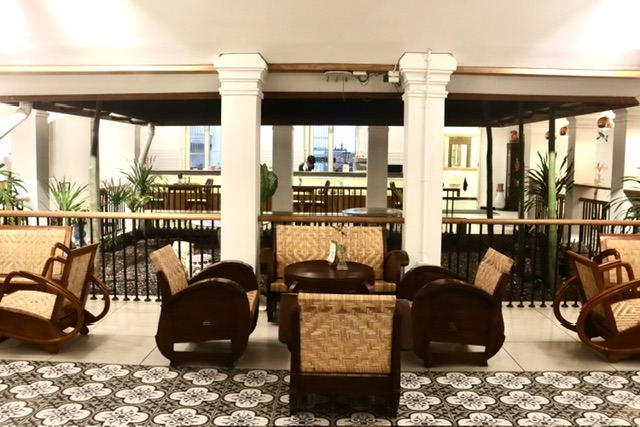
Upon entering, I found a semi-open square-shaped room, with an open space in the middle arranged as a small garden. The second room seemed to be the main dining area because there were more chairs and tables arranged there. At the front of the room, I can see vintage furniture comprising tables and chairs. Meanwhile, at the back, there was a kind of bar where the staff prepared drinks and arranged food before serving them. The left and right wings of the room were occupied by tables and chairs suitable for two people. On the left wing, there was a door leading to an outdoor terrace that served as a dining area for smokers.
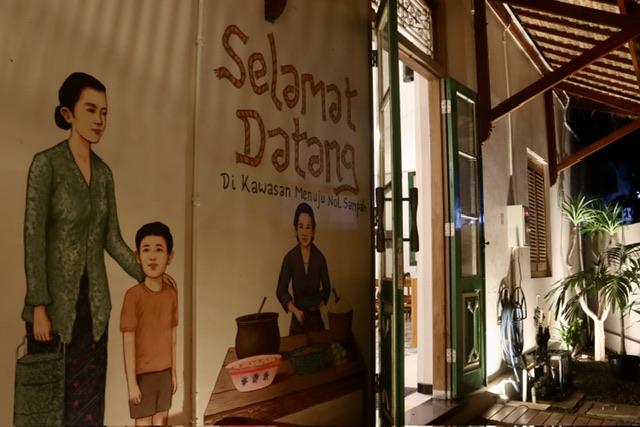
Walking further back on the outer terrace, there is an open yard covered with fairly large gravel stones. There is a circular construction made of cement that can be used as seating, and in the corner, there is a separate space specifically for plants. Overall, from front to back, the restaurant space is not very large, but it feels spacious with a neat arrangement.

The colonial building used to be the Office of Education and Culture before its ownership was changed and has been occupied by Njonja Munsen Restaurant since 2023.
Njonja Munsen Restaurant is indeed not an ordinary restaurant in carrying out its daily operations. The owner, known as Ms Nini by her staff –a resident of Magelang, has been organizing her restaurant towards zero waste since the beginning. Therefore, the restaurant management willingly undertakes many extra tasks to achieve that goal.
The Zero Waste Concept
At first glance, when looking around the restaurant, my initial impression is that there is no tissue paper on each table. The elimination of tissue paper usage on dining tables and in operating the Restaurant is based on the consideration that the raw materials of tissue paper come from wood fiber, and tissue papers are disposable. As an alternative, the restaurant uses napkins or cloth rags that are sorted based on their usage. There are napkins on the dining table (guest napkins), and there are napkins for cloth rags that are still sorted: for wiping utensils, furniture, and hands. That’s just a step towards cleanliness.
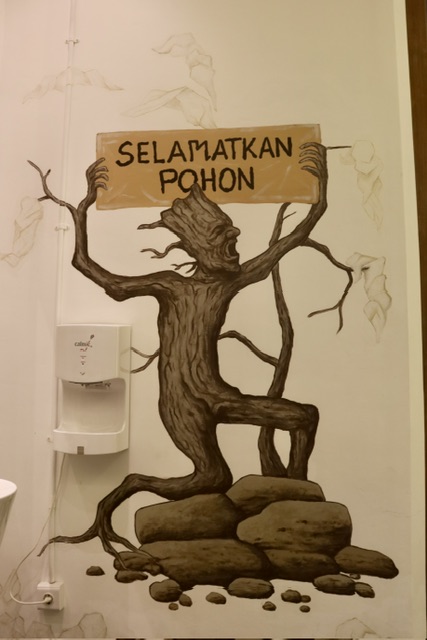
For cooking needs, the Restaurant already has specific vendors who provide kitchen necessities. Some vendors come directly to the Restaurant, such as egg, meat, rice, and vegetable vendors. The Restaurant provides containers to them so that there is no accumulation of single-use containers (waste).

Raw food ingredients such as meat are stored in the refrigerator in containers made of a type of silicone that can be cleaned, washed, and reused multiple times.
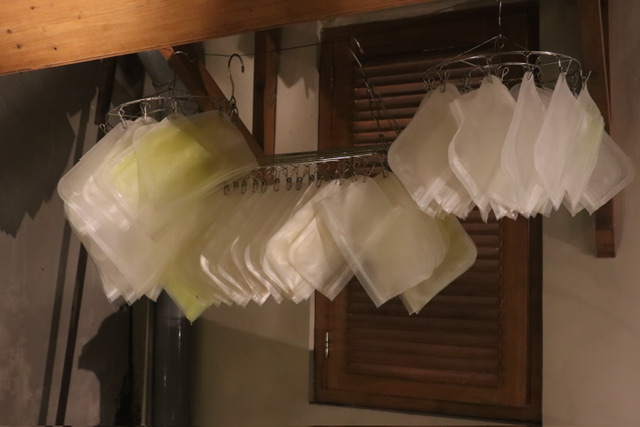
The restaurant has designated waste bins based on their types. For dry waste (inorganic), there is a special room to store paper, glass, cans, and plastic that can be recycled. When I peeked into that space, I saw several media lined up for growing mushrooms. “Eventually, the mushrooms will be used as ingredients in our dishes,” said the kitchen staff member who was guiding me. For recyclable dry waste, the restaurant collaborates with the local waste bank.
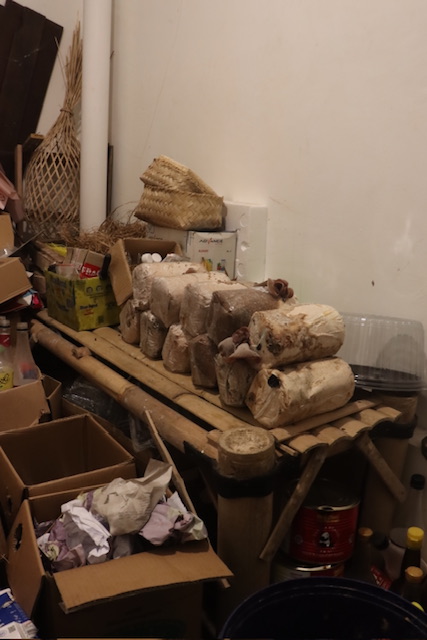
“It cannot be denied that some external waste, such as plastic or tissue papers, still finds its way in,” said Wahyu, one of Njonja Munsen Restaurant staff members. Meanwhile, organic wet waste such as food scraps and vegetables are directly put into the composter located at the back. Njonja Munsen Restaurant has also collaborated with several collectors such as eggshell collectors and bone collectors who will take the waste for further processing.
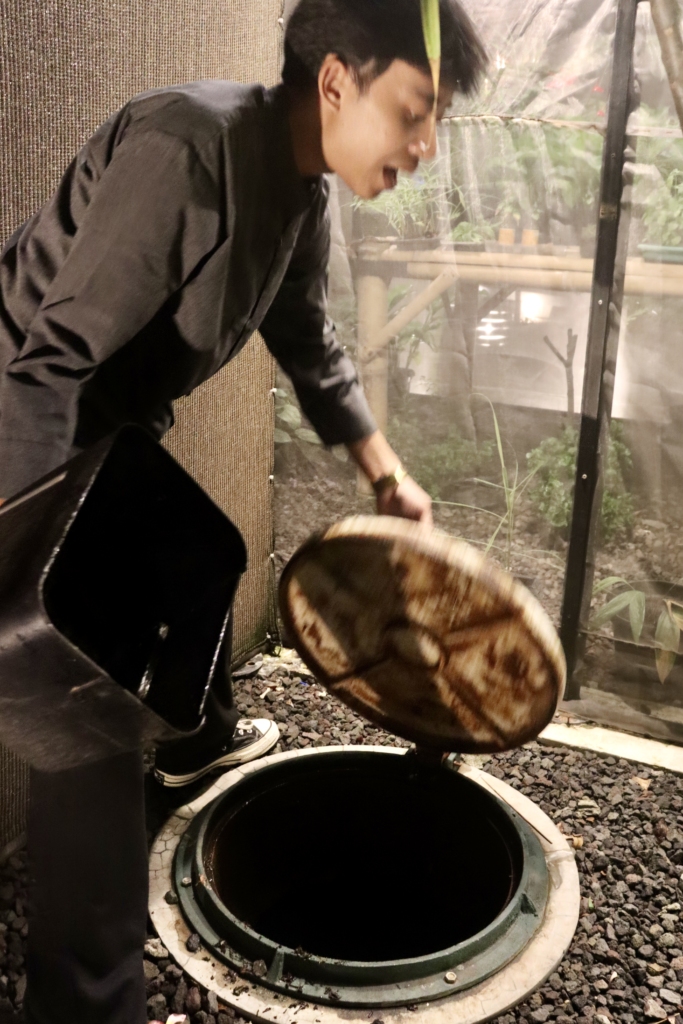
The Restaurant also has a freshwater fish pond whose product can be harvested for the restaurant’s dishes. In the backyard, there is a separate space called the Green House. In the Green House, there are pots planted with various herbs and plants that can be used for cooking, including edible flowers for garnishing dishes and leaves and rhizomes for seasoning.

Furthermore, to maintain the quality of the surrounding air, a smoke filter chimney has been installed in the backyard where the electric generator is located. Therefore, when the generator is turned on and emits smoke, the smoke has already passed through the filter.
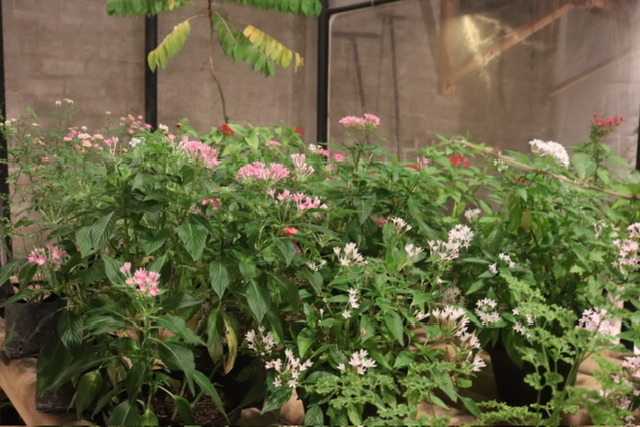
In the washing area, I saw a piece of homemade soap on top of the washing machine. “We are learning to make soap from used cooking oil,” Wahyu added. Therefore, the Restaurant learns from the Recycling Innovation House (RInDU), the Center for Agrotechnology Innovation at Gajah Mada University for waste processing.
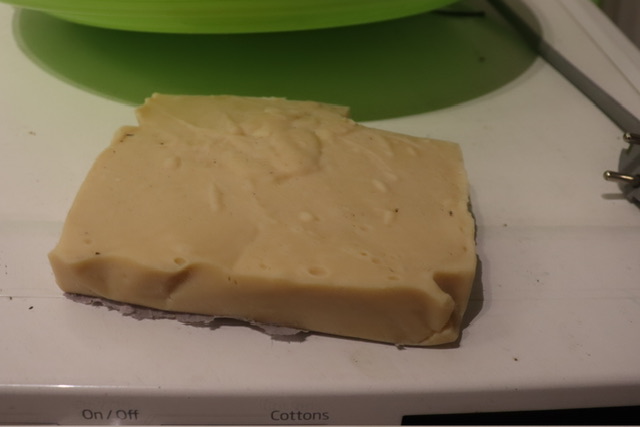
It certainly takes strong determination to operate an environmentally friendly restaurant comprehensively. “Our owner is conscious of environmental issues,” Mr. Wahyu explained why the restaurant is willing to undertake many extra tasks. The restaurant owner, who is also the owner of Front One Resort Magelang, is concerned about the current waste issue, and beyond that, he is inspired by Laudato Si’.
Laudato Si‘ (Italian for ‘Praise Be to You’) is an encyclical (a type of papal directive in the Catholic Church) by Pope Francis in 2015. The encyclical consists of several chapters that broadly focus on the environment, environmental issues, and the role of humans in the future of the environment and the Earth. It also contains calls and appeals to protect and preserve the Earth for the sustainability of life, the environment, and humanity itself on Earth.

With this foundation, the owner of Njonja Munsen Restaurant implements the Zero Waste concept starting from themselves, in this case, within the small scope of their restaurant. All employees are also required to adhere to Zero Waste practices. “They bring their food containers. If they buy food with packaging, they must take responsibility for the packaging waste,” Mr. Wahyu added. To support the Zero Waste spirit, in the recruitment of employees, the restaurant management will inquire about the willingness of potential employees to commit to the Zero Waste concept before they agree to join.
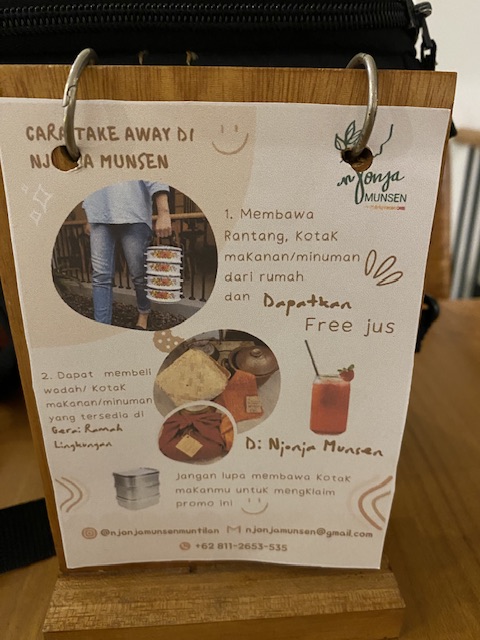
The introduction of the Zero Waste concept as something relatively new has received various responses from guests who come. “Some understand, some are indifferent, and some do not care,” said Mr. Wahyu, who works in the cashier section. Education about Zero Waste is also provided to employees through monthly training sessions.

Njonja Munsen Restaurant, which offers a variety of Peranakan, Nusantara, and Western dishes at competitive prices, is the sole dining establishment in Muntilan that adopts a comprehensive environmentally friendly concept. Visitors are also encouraged to bring their containers if they want to take their food home. The restaurant’s efforts to promote an environmentally friendly lifestyle in line with the spirit of Laudato Si’ are praiseworthy.
Opening hours: 10.00 – 22.00
Location: Jl. Tambakan No.01, Tegalarum, Tamanagung, Kec. Muntilan, Kabupaten Magelang, Jawa Tengah 56413
